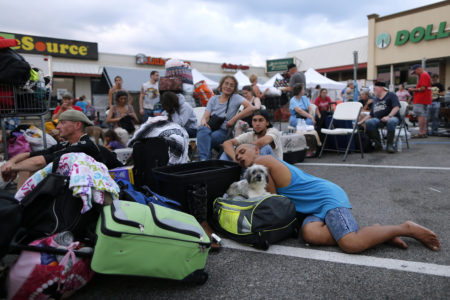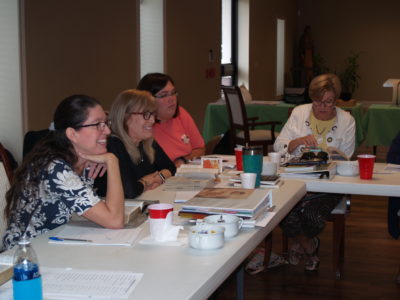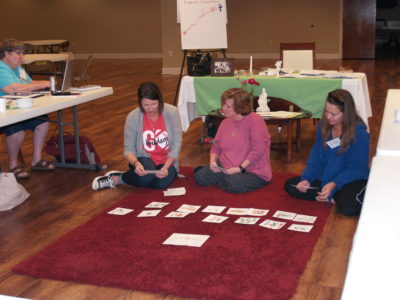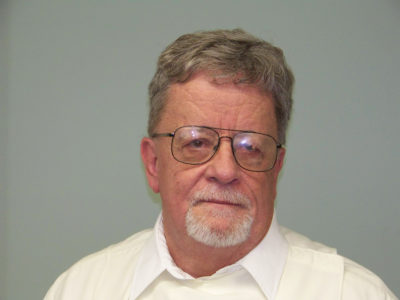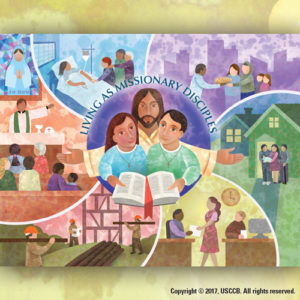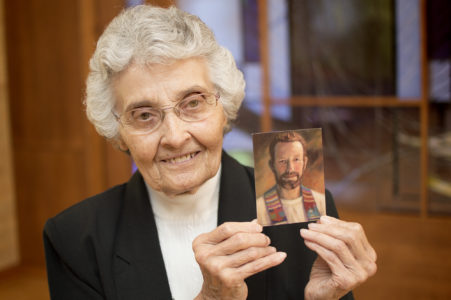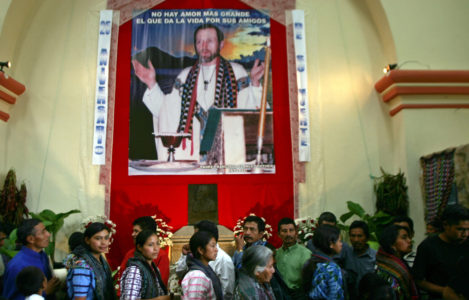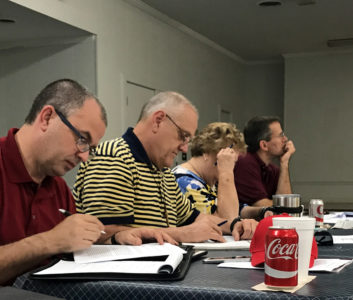
LOUISVILLE – Deacons Ted Schreck and John McGregor; Paula Fulton, Lay Ecclesial Minister for Louisville Sacred Heart, and Deacon Jeff Artigues, take notes at their retreat. (Photo by Pam Minninger.)
By Maureen Smith
JACKSON – Lay Ecclesial Ministers (LEMs) and deacons from the Diocese of Jackson made a retreat Wednesday, August 23-26 at Lake Tiak O’Kahata. This is the first time the two groups have retreated together, but probably not the last.
The Diocese of Jackson has a committee for continuing formation that helps make spiritual and educational opportunities available to its ministers. This group planned the gathering. Deacons and priests are required to make a retreat annually while LEMs are strongly encouraged to do so. The priests usually make their retreat during the Easter season. The diocese used to offer a retreat for LEMs, but the practice had fallen off in recent years.
Committee members thought gathering the lay ministers and deacons would be good for both groups. Deacon James Keating from the Institute for Priestly Formation at Creighton University led the retreat with the theme interior life and ministry.
“We talked a lot about contemplative prayer,” said Pam Minninger, LEM at Gluckstadt St. Joseph Parish. She said Deacon Keating used the analogy of training a puppy to sit. “When we get to a point in prayer that’s hard, we don’t stay long enough to let God sit, stay and heal. He used heal instead of heel for the image,” she explained. “He told us we need to bring our hurts and needs to God and sit with him long enough to let him reveal to us where they are coming from and let God pour himself into those hurts,” she added.
The retreat itself was structured to let the participants do just that. The group took breaks for contemplation, daily Mass and attended Eucharistic Adoration every night. “Deacon Keating gave us what we needed to dig deeper into ourselves,” Janice Stansell, LEM for Crystal Springs St. John Parish. She said attending adoration with her fellow ministers was especially moving.
“This let us take some time to gather what we need to do the work of Jesus in the church,” said Stansell. She said she truly appreciated that the gathering was entirely for spiritual enrichment. Stansell likes the workshops and meetings she has with fellow ministers, but thinks this kind of gathering is essential. “We don’t see each other all the time, and when we do we are usually in ‘work mode,’” she explained.
Deacon John McGregor agreed. He said it was good for the deacons and lay ministers to hear about one another’s ministries and get to know the “reality of the Catholic Church in Mississippi,” particularly the difference between larger and smaller parishes. “It was good for us to hear about the whole character of the Diocese of Jackson,” said the deacon, who is working with the diocese on putting together a new class of deacon candidates.
He also found the theme of the retreat to be a good reminder for his prayer life. “We do need to sit in prayer, but we are thinking, ‘I need to mow the lawn, I need to call that lady back.’ All those things rob us of our prayer, so one of the things we have to discipline ourselves to do is to stay in prayer,” he said.
“This was probably the best retreat I have been to in a long time,” said Deacon Denzil Lobo, who also the ecclesial minister for Jackson Christ the King Parish. He and five other men were ordained as permanent deacons a little more than a year ago. They had all spent five years in formation for ordination, which included some intense theological studies. “This retreat offered nothing academic. It was purely spiritual development,” he said. “It gave us time to work on our spirituality, to reflect on how to be leaders and how to minister,” he added.
One of the questions he found enlightening was when Deacon Keating asked “how do you help people let Jesus love them?” He also enjoyed being with his fellow deacons and lay ministers. He just began working at Christ the King so he was able to build some relationships with other ecclesial ministers.
Everyone interviewed for the story hopes the retreat becomes an annual tradition for the diocese and all expressed thanks to Bishop Joseph Kopcaz and the other priests who celebrated Masses during the week.

LOUISVILLE – Deacons Ted Schreck and John McGregor; Paula Fulton, Lay Ecclesial Minister for Louisville Sacred Heart, and Deacon Jeff Artigues, take notes at their retreat. (Photo by Pam Minninger.)

